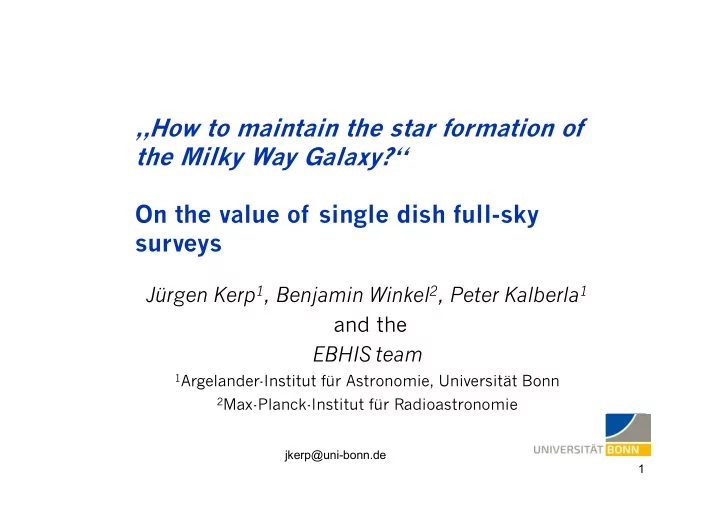

„How to maintain the star formation of the Milky Way Galaxy?“ On the value of single dish full-sky surveys Jürgen Kerp 1 , Benjamin Winkel 2 , Peter Kalberla 1 and the EBHIS team 1 Argelander-Institut für Astronomie, Universität Bonn 2 Max-Planck-Institut für Radioastronomie jkerp@uni-bonn.de 1
HI 21-cm line data Adopted Wikipedia jkerp@uni-bonn.de 2
HI 21-cm line data Peak → lower limit to gas temperature FWHM → upper limit to gas temperature jkerp@uni-bonn.de 3
Square Kilometer Array (SKA) Wikipedia jkerp@uni-bonn.de 4
Single dish to radio interferometer jkerp@uni-bonn.de 5
Single dish to radio interferometer jkerp@uni-bonn.de 6
Single dish to radio interferometer jkerp@uni-bonn.de 7
HVC 125+41-207: radio interferometer Braun & Burton 2000, A&A 354, 853 jkerp@uni-bonn.de 8
HVC 125+41-207: Effelsberg dish Brüns, Kerp & Pagels 2001, A&A 370, L26 VII-9 jkerp@uni-bonn.de
Radio interferometer are sensitive to small scale structure Single dish telescopes are sensitive to structures on scales of the observed area of interest jkerp@uni-bonn.de VII- 10
Radio interferometer are sensitive to small scale structure Single dish telescopes are sensitive to structures on scales of the observed area of interest Single dish full-sky surveys can disclose structures across hundreds of square degrees jkerp@uni-bonn.de VII- 11
Stray-radiation Winkel et al. (2016), A&A 585, 41 12
Effelsberg-Bonn HI Survey (EBHIS) jkerp@uni-bonn.de 13
Effelsberg-Bonn HI Survey (EBHIS) Effelsberg 100-m key-science project ● started in August 2008 ● first coverage finished spring 2013 ● angular resolution: 10.8’ ● velocity resolution: 1.4 km/s ● sensitivity: ~90 mK ● maximum redshift: 0.07 ● data are public (CDS) ● Motivated FPGA spectrometer technology! ● jkerp@uni-bonn.de 14
Effelsberg-Bonn HI Survey (EBHIS) 10 TByte of raw data ● Software written from scratch ● Many new methods/algorithms developed ● – RFI mitigation (Flöer+ 2009) – Stray-radiation removal (Kalberla; see Winkel+ 2016a) – Flux calibration/Bandpass removal (Winkel & Kerp 2007; Winkel+ 2010, 2012a, 2016a) – Source finding/parametrization (Flöer & Winkel 2012; Flöer+ 1014) – Data gridding (Winkel+ 2016b) – Basket-weaving (Winkel+ 2012b) jkerp@uni-bonn.de 15
jkerp@uni-bonn.de 16
EBHIS first data release after two years jkerp@uni-bonn.de 17
HI4PI: Effelsberg & Parkes Milky Way Surveys HI4PI collaboration: 2016 A&A 594, A116 jkerp@uni-bonn.de 18
HI4PI still a top 10 paper of Astronomy & Astrophysics after a year jkerp@uni-bonn.de 19
Kerp+ 2011 jkerp@uni-bonn.de Winkel+ 2016 20
Kerp+ 2011 jkerp@uni-bonn.de Winkel+ 2016 21
Kerp+ 2011 jkerp@uni-bonn.de Winkel+ 2016 22
Green Bank Telescope: M31 HVCs Thilker, Braun & Westmeier 2005, ASP 331, 113 jkerp@uni-bonn.de 23
EBHIS: M31 HVCs Kerp et al.. 2016, A&A 589, 120 jkerp@uni-bonn.de 24
EBHIS: M31 HVCs Kerp et al.. 2016, A&A 589, 120 jkerp@uni-bonn.de 25
„How to maintain the star formation of the Milky Way Galaxy?“ jkerp@uni-bonn.de 26
Persistent fueling: no evidence for major mergers jkerp@uni-bonn.de 27
Halo and disk-halo interface Marasco, Marinacci & Fraternali 2013, MNRAS 443, 1634 jkerp@uni-bonn.de 28
Magnani & Smith 2010, ApJ 722, 1685 jkerp@uni-bonn.de 29
Magnani & Smith 2010, ApJ 722, 1685 In 2010 about 11 molecular IVCs were known jkerp@uni-bonn.de 30
jkerp@uni-bonn.de 31
jkerp@uni-bonn.de 32
Dust to HI gas molecular molecular atomic atomic T. Röhser 2016 Ph. D., U. Bonn jkerp@uni-bonn.de 33
Finding molecular IVCs: Gaussian decomposition Kalberla & Haud 2015, A&A 578, A78 jkerp@uni-bonn.de 34
IVC 86+38 T. Röhser 2016 Ph. D., U. Bonn jkerp@uni-bonn.de 35
jkerp@uni-bonn.de 36
jkerp@uni-bonn.de 37
North Röhser et al. 2016, A&A 596, 94 jkerp@uni-bonn.de 38
North HI 21-cm line data Röhser et al. 2016, A&A 596, 94 jkerp@uni-bonn.de 39
South Röhser et al. 2016, A&A 596, 94 jkerp@uni-bonn.de 40
South artefact MS Röhser et al. 2016, A&A 596, 94 jkerp@uni-bonn.de 41
North-south asymmetry Total numbers of FIR excess IVCs ~ 1000!!!! 694 MIVCs towards the northern sky 389 toward the southern sky Large clouds (> 35 arcmin) Röhser et al. (2016), A&A 596, 94 jkerp@uni-bonn.de 42
North-south asymmetry Total numbers of FIR excess IVCs 694 MIVCs towards the northern sky 389 toward the southern sky Large clouds (> 35 arcmin) Röhser et al. (2016), A&A 596, 94 jkerp@uni-bonn.de 43
North-south asymmetry Total numbers of FIR excess IVCs 694 MIVCs towards the northern sky 389 toward the southern sky Large clouds (> 35 arcmin) Röhser et al. (2016), A&A 596, 94 jkerp@uni-bonn.de 44
MIVCs: tiny extent and mass, but many Röhser et al. (2016), A&A 596, 94 jkerp@uni-bonn.de 45
MIVCs: tiny extent and mass, but many Too faint and too tiny to detect them beyond the Magellanic Cloud System Röhser et al. (2016), A&A 596, 94 jkerp@uni-bonn.de 46
MIVCs: tiny extent and mass, but many Total local mass of IVCs 3.1 10 6 M sun Up to 0.5 M sun a -1 Only 10% of the Milky Way halo is probed Röhser et al. (2016), A&A 596, 94 jkerp@uni-bonn.de 47
What next? jkerp@uni-bonn.de 48
EBHIS: confirmed galaxy detections Flöer 2015, PhD thesis Bonn University jkerp@uni-bonn.de 49
EBHIS: Zone of avoidence Schöder, Flöer, Winkel in prep. jkerp@uni-bonn.de 50
EBHIS: radio continuum full sky map Winkel et al., in prep. jkerp@uni-bonn.de 51
Foregrounds jkerp@uni-bonn.de 52
Polarization and Faraday rotation N HI map Planck polarization fraction Bachelor these A. Manthei 2017 jkerp@uni-bonn.de 53
Polarization and Faraday rotation N HI map Planck Faraday rotation Bachelor these A. Manthei 2017 jkerp@uni-bonn.de 54
Polarization and Faraday rotation Dust temperature (Planck) Faraday rotation Bachelor these A. Manthei 2017 jkerp@uni-bonn.de 55
Cosmic infrared background (CIB) D. Lenz, 2016 Ph. D., U. Bonn jkerp@uni-bonn.de 56
Cosmic infrared background (CIB) D. Lenz, 2016 Ph. D., U. Bonn jkerp@uni-bonn.de 57
eRosita (2019): X-ray full-sky survey MPE jkerp@uni-bonn.de 58
Dark Gas: correlation with X-rays HI 21-cm column density 0.25 keV ROSAT J. Kerp „X-ray astroomy“ 2003 jkerp@uni-bonn.de 59
Thank you Poster of Charitarth Vyas on gas accretion jkerp@uni-bonn.de 60
Recommend
More recommend